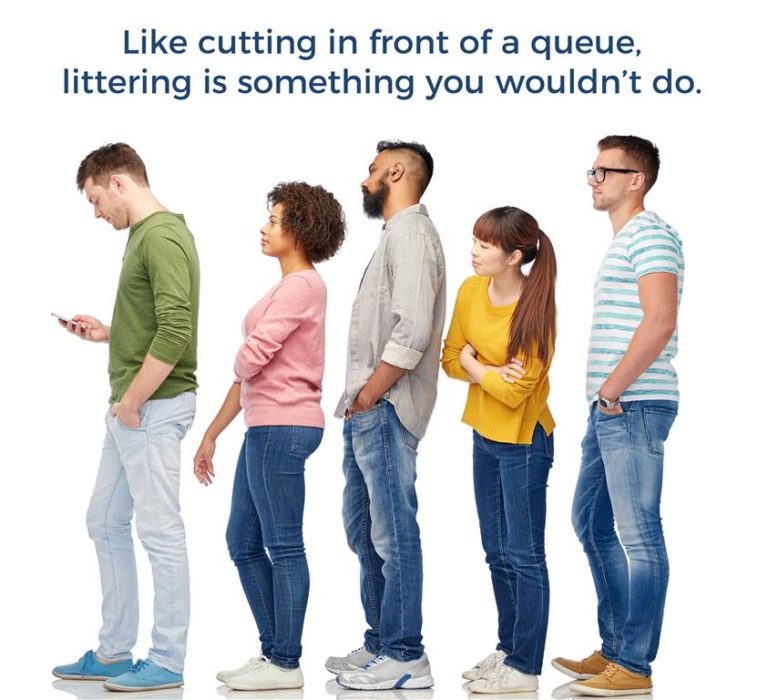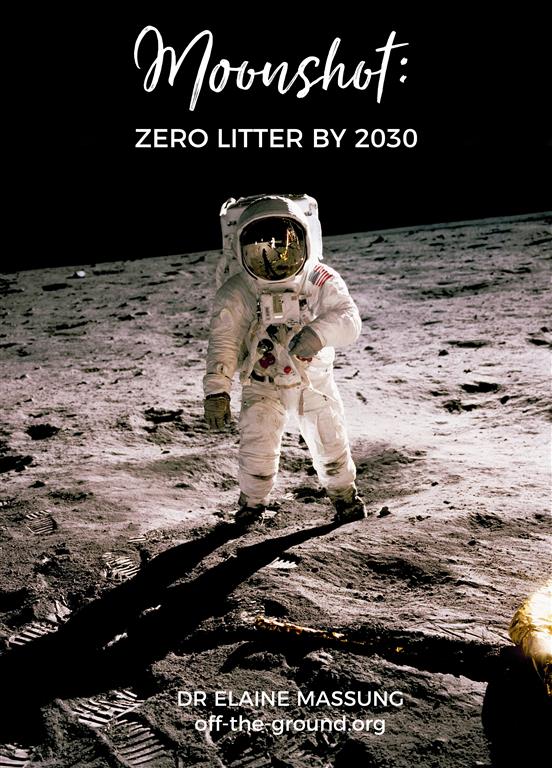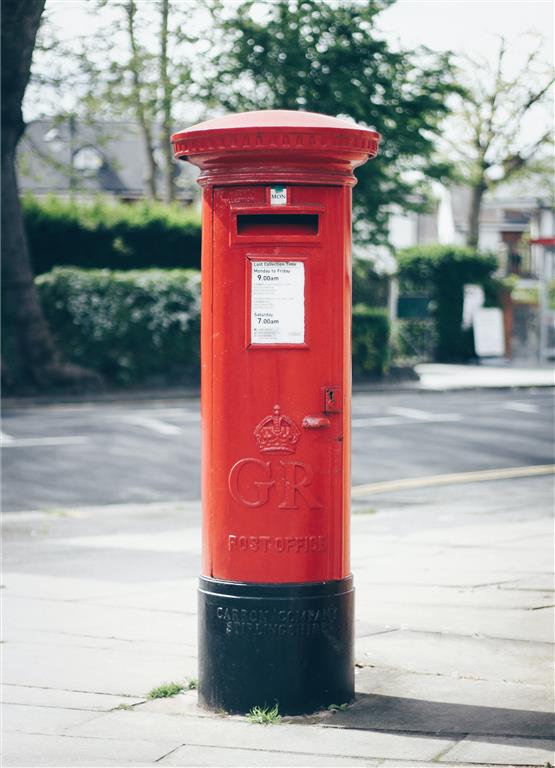
“I just don’t understand why people litter! It makes no sense!”
Words to this effect are what I hear most often when running a community litter pick. And it’s fantastic that so many people recognise the importance of keeping our communities and countryside clean and tidy for ourselves and our wildlife. However, it’s also important to try to understand what drives littering behaviour in the UK if we want to have any hope of developing interventions to stop it.
After all, littering may not make sense to those who don’t litter, but it is perfectly logical to someone who does. Human behaviour is such that they wouldn’t do it otherwise. After all, how many times have you heard someone say the following (or said these words yourself): “Well, it made sense to me at the time …”
Indeed, previous research into the subject highlights that rather than looking at the world as composed of two types of people—those who never litter and those who always do—it is best to think of “littering incidents“: situations where people choose to litter based on context rather than strictly based on demographics. Until we recognise that there are a myriad of reasons and contexts—and no one-size-fits-all solution—then we cannot take the necessary steps towards actually stopping the problem. Instead, we will continue to engage in litter pick after litter pick with no end in sight.
Over the past four years I have written the Off the Ground blog and helped remove nearly 400 bags of rubbish and over 10,000 items of recyclables from the streets of my community. This has given me a lot of time to think about the potential reasons for littering, and I have assembled all of these into this handy-dandy summary.
But first a thought exercise.
Imagine for a moment that you look down on your shirt and see a crumb from your lunch, a loose thread or strand of hair, or perhaps a bit of fluff from the tumble dryer. What is your reaction?
If you’re like most people, myself included, you brush the offending bit of detritus onto the floor without a second thought. After all, it will be cleaned up later. The difference between this and littering? Simply a matter of scale. Although this list is in no particular order, it brings me quite nicely to the first reason people litter:

They don’t recognise their behaviour as littering
Earlier research has shown that different age groups have different definitions of litter. If your mental model of littering is a picture of someone maliciously throwing an item to the ground, and you carefully place your rubbish on a bench or a wall, then it’s not littering. I can almost guarantee that a businessman I spotted at the Chippenham railway station behaving in exactly this way in front of his co-workers didn’t see his actions in a negative light … even if the results are exactly the same.
Or look at cigarette butts: these are the number one littered item in the world because the vast majority of smokers think it’s just a bit of paper, not plastic that can take up to 10 years to degrade (leaching out harmful chemicals while doing so). Keep Britain Tidy is running a campaign to address this idea of “careful littering” … but will people identify their own behaviour and change it?

Ease and convenience
Based on my own career as a behaviour change researcher, I can point to numerous academic articles that state that convenience often trumps even monetary considerations when it comes to shaping behavioural choices.
When it comes down to it, the action of not littering—i.e. finding and using a bin or carrying a piece of rubbish home—takes far more time and effort than littering. Until littering is made more difficult, whether with social consequences, fines, or some type of other “friction”, it will continue to be the easy choice. In speaking with a teenager at an Off the Ground clean up, I asked why people his age littered. His response: “They want to get on with their lives as quickly as possible.” How do we enable not littering to fulfill this goal?

Habit
According to research, nearly 40% of what we do each day boils down to habit, with the aforementioned discarding of cigarette butts just one example of this in action. Charles Duhigg’s excellent book The Power of Habit describes habit loops as being formed from a cue, a routine, and a reward, and I see littering as being part of the “rubbish disposal” habit.
Perhaps a person starts to use the time at a red light (cue) to clean out their car by dropping their rubbish from the window (routine) because it is then one less thing they have to do when they get home (reward). Each time someone litters, the habit is reinforced just a little bit more and the litterer is desensitised to what they are actually doing. When coupled with one or more of these other reasons, it builds a powerful feedback loop that can be hard to break.

Norms
Beyond individual habits, there are social and cultural norms at play in every society. This is why in many countries you shake hands, in some you bow, and in others you kiss cheeks when greeting one another. In the UK, if you are looking for a clue about how to dispose of your rubbish, you don’t have to look far: litter is strewn along motorways, fly-tipped at laybys, and discarded along the footpaths and streets of our communities. It lines our rivers, is left on our beaches, and is dropped in our beauty spots. Clearly, the way to get rid of your rubbish is simply to add it to the existing pile.

Bad examples
That last sentence was obviously a rubbish joke. Mostly. But the serious side of this is that some people are never taught the proper behaviour. This may be witnessing a parent or sibling litter while growing up. It may be seeing friends do it as an adolescent (and dealing with the resultant peer pressure of wanting to fit in). But if you have not firmly internalised and adopted the value of not littering, then you do not see what the problem is. This behaviour then reinforces that of others by setting a new social norm: littering is okay. After all, if litter is seen everywhere, then everyone must litter.

Littering makes a job for someone /
it is someone else’s job
These evil twins pop up far more often than the pair in The Shining. I have to admit that I never would have thought of these on my own because of their sheer ridiculousness, but David Sedaris mentioned it during the parliamentary litter inquiry in 2015. I filed it away as an American author exaggerating things; we tend to be fond of hyperbole. But just a few months later I saw someone make a comment online to this effect: they didn’t see what the big deal was, after all, littering made a job for someone. It appeared again and again in various guises: What’s the problem? Those people doing Community Payback will pick it up. The Council will get it. They, them, someone else.
This is reinforced in trains, stadiums, theatres, and cinemas, where people regularly leave their rubbish behind with the expectation it will be tidied away. Is it any wonder that this habit then extends to other parts of their life?

“I pay my council tax”
A toxic cousin to the twins above is this one that I have seen a few times with regards to fines, and it goes something like this: I pay my council tax, which pays for litter to be picked up, therefore I am already paying for litter collection, ergo it is okay to litter (so don’t you dare fine me!).
Until an overwhelming majority of the population accepts that cleaning up litter is a waste of taxpayers’ money and could be better spent on other things—including jobs that involve beautifying our communities rather than trying to keep on top of the rubbish—then this and the twins are difficult mindsets to shift.

Cleanliness
This one may seem paradoxical, but I am firmly convinced that some people litter out of a desire to be clean: No bins in sight and no interest in getting crisp crumbs in a pocket? Just shove that crisp packet in the crack of a bench. Almost-but-not-quite empty aluminium can? Just leave it so that someone can pick it up and recycle it.
This hypothesis was confirmed when chatting with a few acquaintances about litter (talk to me long enough and the conversation will come around to litter). One was a cyclist and he said that members of his cycling club tended to chuck empty energy gel packaging because they didn’t want to deal with the sticky packets. He also pointed to norms: his cycling colleagues would watch professionals toss water bottles and rubbish then see nothing wrong with doing likewise (I hasten to add that he has started telling them off for littering). Another person ranted about how much they hated litter and that they at least have the decency to feel guilty when they drop sticky sweet wrappers.
UPDATE APRIL 2020:
The coronavirus pandemic has shown this to be a potentially powerful reason for litter, with disposable gloves, masks, and cleaning wipes becoming part of the detritus in our communities. The desire for personal cleanliness appears to trump social responsibility and respect.

Hiding something
Related to the paradoxical idea of cleanliness is the possibility of hiding something from others by leaving it out for everyone to see. Scoffed a McDonald’s on the way and don’t want your family to know about it? It’s very simple to chuck it out a window at a red light or ditch it in a car park. Drinking more than you should? Just leave the empty can or bottle behind. Nothing occurred if there’s no evidence.

Packaging design
The difficulty with packaging design is that it is based on what sells, not what is best for the environment. So companies like Lucozade and Pringles can continue to get away with producing containers that are regularly listed as being almost impossible to recycle. Cadbury’s can use easy-tear strips that allow customers to get into the sweets fast … and then discard the torn strips even faster. Labels and lids on discarded bottles can easily turn one piece of litter into three or more. A shift to making packaging as eco-friendly as possible—both with regards to the material it is made from and the amount of removable parts—could help minimise damage while shaping behaviour.

Balloon and Sky Lantern Releases
The idea that what goes up must come down has escaped so many people and organisations. In these instances, their desire to carry out an annual tradition or remember a loved one trumps common sense and environmental stewardship. However, no matter how good someone’s intention is, the fact is that this is littering: outright bans are needed.

Smokers
Not all smokers litter, but a significant amount of discarded rubbish falls into the category of smoking paraphernalia: cigarette cartons, tobacco pouches, roll-up paper. All of this is on top of the one trillion cigarette butts that are discarded each year across the globe. It’s easy to imagine someone with the habit of regularly discarding a butt on the ground graduating to tossing a carton or another bit of related rubbish.

Drunk
Research has shown that how people behave when drunk is not universal, but rather affected by their cultural norms. This means that each culture behaves differently when drunk, and, as a short tangent, the same research has shown that people behave this way when they think they’re drunk, even though in reality the drinks they were served were non-alcoholic.
But alcohol and litter go hand in hand, at least in Chippenham. Alcohol containers are usually the number one littered recyclable found, and our list currently has over 250 different alcoholic brands on it. I can almost guarantee that the last thing a drunk—or even slightly squiffy—reveller is thinking about on a night out is where to recycle their bottle or can.

Out of sight is out of mind
Sanitation and waste disposal in general aren’t things that people want to think about. In the developed world, we take it for granted that toilets will carry our bodily waste away from us and the Council will cart our household rubbish and recycling somewhere else. So for someone who makes the decision to litter—in particular those who toss rubbish off bridges or decorate trees and hedges with dog poo bags—this disposal of waste makes a kind of sense: it’s out of their sight with very little thought as to what happens next.

Because they can
Whether an individual has a strong anti-authoritarian streak and sees littering as giving a two-fingered salute to The Man (“No one tells me what to do!”), or is more strongly motivated by one of the other reasons listed here, the current state of our littered roadways and communities comes down to the fact that there is nothing in place to stop people from littering in the first place.
The funny thing is that I can think of far fewer reasons for the reverse of the question: Why don’t people litter?

Good examples
If you had it drilled into your head as a child that littering was not acceptable, and perhaps your parents even took you litter picking, then it is likely that this behaviour will continue through adulthood.

Habit
In the situation of someone being raised not to litter, not littering has become the ingrained habit.

Culture
Cultural norms can play a big role in behaviour by making certain actions automatic. In Japan, for example, cleaning up after yourself starts at a young age, and there is no question about how to handle rubbish: it gets disposed of properly.

Recognise the problems litter causes
The problems caused by litter are many. Besides the aesthetic issues, litter can kill or injure wildlife, lower property values, and it is an unnecessary cost in a local authority’s budget.

Pride
If you have pride in where you live, whether that’s at a community level or nationally, you want to do what’s possible to show the area in the best light.
So, what do we do about it?
One of the common ways of trying to change behaviour is by using something called the information-deficit model. The theory goes that if people were just aware of the information that they’re lacking, then they would carry out the desired behaviour. Job done.
There is one little problem with this: it doesn’t really work, at least not on everyone. People know smoking is bad for their health, but they do it anyway. People know they should save for retirement, but they tend to put far less away than they should. People know they should ditch the dessert if they want to lose weight, but they continue to reach for their preferred sugar-rich treat.
Again, what do we do about it? I have some thoughts that I’ll share in a future blog post, but here’s a sneak peek:
- Constant and consistent messaging: Day in, day out, year after year, a new message has to be communicated to replace the current norms: we are a nation that cleans up after ourselves.
- Stop preaching to the choir: Most anti-litter campaigns use words and imagery that appeal to those who are already unlikely to litter. Finding what resonates with those who do is imperative.
- Use all of the tools at our disposal: From Deposit Return Schemes to enforced fines, the toolbox is vast. Why are we using only one—litter picks—to tackle the problem on a regular basis?
Why People Litter: The Sequel
Even more potential reasons for littering … and the challenge of finding the right message to help tackle it.
UPDATE APRIL 2020
This is the most popular blog post I have ever written, being viewed even more than the one about the royal wedding!
Since writing it, I have continued to think about how we can take the necessary steps to stop litter at its source. The only thing that seems like it will have a genuine, lasting impact and cover as many of these reasons as possible is to change the entire culture of the UK. Of course, we can continue to talk about the weather, stand patiently in a queue, and enjoy a wry sense of humour … but the mindset of “my rubbish, my responsibility” has to become as British as fish and chips.
To do this, we must remove any confusion about how to handle rubbish and activate a societal auto-pilot. There should be no questions about what to do with rubbish while out and about: the choices are 1) find a bin, 2) find a recycling bin, or 3) take it home. It doesn’t matter whether you’re on a bus or a train, at the cinema or in a stadium, or in a park or at a festival. We must eliminate the idea that littering is a good thing because “it makes a job for someone”. A cultural attitude of “I clean up after myself” must be as natural as making a cup of tea.
To get to this point, there needs to be a concerted effort from everyone at all levels: government, industry, and members of the public. All must have the desire to make a change and agree that littering and fly-tipping are priorities and will be taken seriously. Without a strong desire, enthusiasm, and a willingness to give 100%, any type of change is unlikely to stick. Half-hearted measures and a meh attitude won’t cut it.
Above all, we must act. I have said it before, but it bears repeating: strategies aren’t worth the paper they’re printed on if they’re not also acted upon. We must use the full range of available tools to bring about the changes we want to see. And if we don’t start now, then when? We create the future with every day that passes in the present, and I would love to see a litter-free UK by 2030. It’s not impossible: it just takes action.
Start here to read more about how this can be achieved:
Creating a Cleaner Culture
Culture can be described as the unwritten rules that a group of people follow. In the UK, for example, you just don’t jump to the front of a queue. Ever. However, at present there is no social consequence for littering. Perhaps more importantly, there is no unified message about how to dispose of rubbish: this must be clearly and consistently addressed for any lasting change to occur.
Moonshot: Zero Litter by 2030
This post builds on my 2016 Think, Speak, Act Litter Strategy to set out what needs to be addressed in order to solve the problem of litter, rather than ongoing mitigation as we are doing now. It offers a number of suggestions and highlights the importance of joined up thinking across all agencies who deal with rubbish, from DEFRA and Highways England to Network Rail and local authorities. Litter is a national problem that should be solved on a national level.
An Open Letter to Stop Litter
An information request from a local councillor served as the starting point for me to create an action plan, building on the Moonshot strategy. These points are something that any community could potentially follow themselves, but wouldn’t it be great to see something like this across the UK?
Gov’t Announces Bold New Plan to Tackle Litter
I was planning to write an April Fools post this year about how all the voluntary litter-picking groups have gone on strike until progress was made to find a solution for litter. However, it seemed to hit slightly too close to home as all community litter picks and the Great British Spring Clean had to be postponed. So, I spent the last week of March throwing this advertising plan together based on the action points outlined in my earlier blog posts. I also had far too much fun with it, so expect to see more fake ads at some point!
11 Ways Big Brands and Small Companies can Take a Stand Against Litter
There is a big role for business to play in the battle against litter, but first they have to get over their fear of offending customers and be willing to do more than just sponsor litter picks. Showing that they are making genuine steps (not greenwashing) towards tackling environmental problems can only be a PR win. After all, shouldn’t we all be on the same side, with the same ultimate goal: a permanently clean UK?
Expanding Our Influence
There is so much more we can be doing in the battle against litter beyond just picking it up. How we can use our existing contacts and activities to widen our potential influence and avoid re-inventing the wheel?








Thank You Dr Massung. Insightful article. Previously I had read that people are more likely to litter where there is already litter on the ground, and some research about littering behavior can be related to how others in the group are behaving. Your article added much more insight.
I added a link to your article onto my website @ https://litterwithastorytotell.blogspot.com/
Bernie Paquette
Jericho, VT (formerly of South Burlington, VT)
Author
Thank you for your comment and for sharing this post more widely! Litter definitely attracts litter, and I think that’s a reflection of social norms at play: it shows people how to behave and, unfortunately in this particular situation, it’s the wrong behaviour. Likewise group behaviour: humans are social animals and they look to others to see what to do. If someone in your “pack” or “herd” litters (or people you perceive to be like you), then it sends the implicit message that it’s okay for you to litter too. The success of the “Don’t Mess with Texas” slogan harnesses this quite well: https://off-the-ground.org/too-many-questions-not-enough-answers/
Great blog. I think much more could be done to make littering socially unacceptable through effective advertising – i e. hard-hitting and aimed at the people who litter (“Keep Britain Tidy” is far too polite and nannyish).
I lived in Australia for a while and they had some advertising slogans that made their point in a more forthright and targeted way, such as “Don’t be a Tosser!” aimed at car drivers and “Bin your butts!” aimed at smokers.
Author
Thanks for getting in touch! I agree that far more needs to be done to target those who actually litter and to stop preaching to the choir. The “Don’t be a tosser!” message is being used now in the UK (I caught sight of it recently down in Dorset), but whether it’s being enforced is another question.
The converse is also true – removing litter encourages the removal of litter. We have been removing litter with FORCE now for 16 years and monitoring the process closely for the last three years. We are finding that the first time we go to a new place there is a huge amount of litter and this reduces year on year. Some of the best used places, where we go regularly are now essentially self policing, with fewer people littering and more people picking litter up as they walk.
It has been a long journey but we feel like we are getting there thank goodness – to be merely picking up the same amount of litter year after year would be soul destroying. See http://www.force.org.uk/what-we-do/projects for our latest report on litter in the Crane valley West London
Author
Thanks for sharing the work FORCE has done; what fantastic progress! Unfortunately, we haven’t had the same success in Chippenham; after the “litter of ages” is removed, the amount collected on a regular basis has stayed stable or increased in our local parks. I suspect that even the downward trend at this year’s Great British Spring Clean was due to a recent clean up from the local authority. On the bright side, some of the residential streets are showing a decrease!
Great Article and does give an insight into why some people litter. Do wish there were less Tossers around! See so much at the side of roads in my current line of work. Especially on motorway junctions / slip roads on and off. I hope that the modern new type cameras that will have really exceptional resolution will capture people who chuck stuff out of their car and they get fines, points and community service orders to make them think twice about their actions
‘…there is nothing in place to stop people from littering’
Thank you.
Once actual fines or legit consequences are handed out for these ‘habits’ we will continously have to rely on those who care to keep our world litter free.
When i was younger i used to wonder if it was better to spread our waste all around as opposed to putting it all in one big hole like the landfill… remember the saying… ‘dilution is the solution to pollution’ ? Haha
Good read!
We need to be more canny about discouraging people, for example on drive through takeaways perhaps printing the reg number on the packaging (NPR would make this possible) and reminding people this is an offence. Also forcing manufacturers to print on their packaging how long it takes for their packaging to degrade so the consumer is aware? I think starting litter picking campaigns in schools and other social clubs would help. Make an event of it, make it fun to pick up. My first organised litter pick was a revelation, that was well over 20 years ago and I have been picking up ever since, still with the use of the picker given to me at that first organised pickup!
I agree with every thing written thank you.
I would also suggest that leaving rubbish next to an already full Bin is also unacceptable. It should be taken home or put in an empty bin.
Much of what is thrown out of cars are from take aways. A tax should be added to all takeaways to pay for the clear up. If the litter reduces so does the tax. I know that MacDonald’s claim they do local pick up but it very localised. They and other companies should be involved to be part of the solution and not the problem.
Throwing rubbish from a car should have the added deterrent of being charged with dangerous driving as you can’t be concentrating on the road whether you or a passenger are chucking something out.
Author
I couldn’t agree more! McDonald’s and other fast-food venues are a particular problem as the litter often ends up miles from the restaurant. I’m starting to think that points on a driver’s license could be a potential deterrent as well, especially as dashcams are more prevalent. Perhaps this would be an incentive for drivers that rely on a clean license to be able to work?
There’s another contributor to litter that you didn’t discuss, namely trucks! I don’t know how it is in the UK but almost a day doesn’t go by that I don’t see a truck with its tarp not tied down properly, or a garbage truck with lots of loose stuff on the outside of the thing that shovels it all inside, or a flatbed with cargo wrapped in paper or plastic that eventually get torn apart bit-by-bit by the wind. Then the truckers themselves are huge litterbugs. Just look at any truck rest stop. I’m sure that some of the litter offenders must know it’s wrong or feel some pang of guilt otherwise how can one explain why there’s so much more litter where they can get away with it, such as highway ramps? The other one here in the States that grinds my gears are the guys who think that once they toss it in the bed of their pickup truck it’s not their responsibility any longer, and not their fault if the wind clears it away for them.
Author
That’s a really good point regarding “accidental” litter from vehicles, Mark. It isn’t exactly deliberate, but it’s not unpredictable either! In many ways, it’s yet another symptom of failing to take waste management seriously. We’re fortunate to have some truckers in the UK working to tackle litter and change things from the inside, but it’s definitely an area that needs more attention. For example, could drivers be hit with points on their license? This may encourage those that need a clean driving license to work to be extra careful.
Thank you for some very important insights given here. I am a waste management advocator in the Solomon’s and might we spend a lot of time just doing litter picking. Maybe I’ll try to incorporate some of the strategies here to enhance our campaign and also add value on some strategies we’re using. For reasons of why we litter in our context, this piece is helpful one way or the other.
Author
Many thanks for taking the time to comment. I wish you the very best in cleaning up your community.